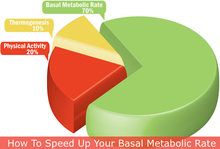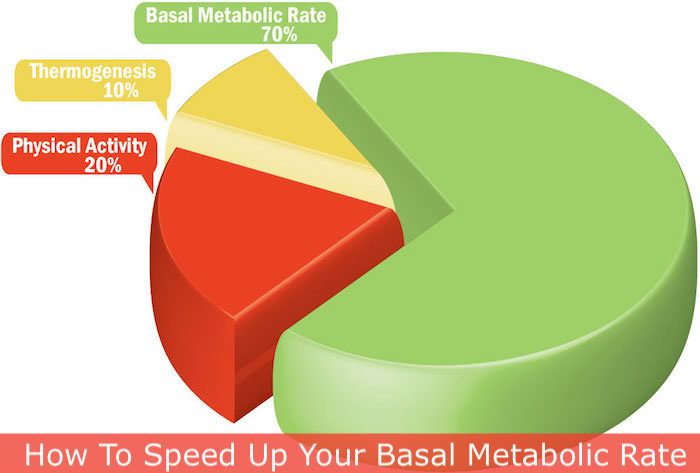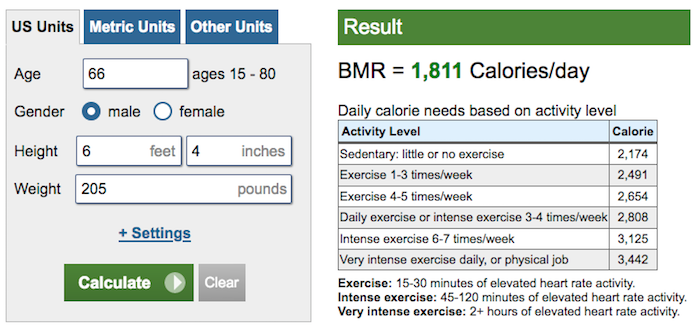How To Speed Up Your Basal Metabolic Rate

To speed up your basal metabolic rate is to give yourself a big edge in burning calories while at rest. How the body uses calories for energy can be confusing. As you’ll soon see, metabolism, thermogenesis, age, gender, and physical activity all play important roles.
METABOLISM — the process by which your body converts what you eat and drink into energy – is popularly regarded as the key reason for you being thin or fat.
Is that true?
Not really.
The Mayo Clinic says:
…contrary to common belief, a slow metabolism is rarely the cause of excess weight gain. Although your metabolism influences your body’s basic energy needs, it’s your food and beverage intake and your physical activity that ultimately determine how much you weigh.
We like simple answers, and actually there is one for how to lose body fat or gain healthy (ie muscle) weight:
- To lose body fat, put yourself into a caloric deficit (fewer calories than you expend).
- To gain weight, put yourself into a caloric surplus (more calories than you expend).
Yes, there are footnotes to these “simple answers”.
For instance:
- It’s a good idea not to cut or add more than 500 calories a day.
- The quality of calories matter. (Read The Best Anti-aging Protein, Fats and Carbs You Can Eat)
- Sometimes toxins and an unhealthy gut microbiome resist your fat-reducing efforts. (Read How To Detoxify Yourself and Why You Absolutely Must, Detox Your Gut — Two Weeks To Greater Health! and How To Heal Your Aging Gut Microbiome.
Before I head too far into the weeds, let’s get back to metabolism.
What I want to impress upon you is that a slow metabolism is unlikely to be the primary reason someone is overweight, and a fast metabolism in unlikely to be the primary reason someone is underweight.
Having said that:
- You do want a metabolism that properly converts food and drink to provide you the energy you need, both when active and at rest; and
- You do want your resting metabolism (BMR) to be high enough to efficiently meet your body’s energy requirements, because as that pie chart above indicates, about 70% of your total metabolic output happens when at rest.
So, let’s explore how you can make that happen:
What Is Metabolism?
Your metabolism is all about making energy for your body to function.
Simply put, energy metabolism is the chemical reactions in the body’s cells that transform food and drink into energy. Energy metabolism is the general process by which living cells acquire and use the energy needed to stay alive, to grow, and to reproduce.
How is the energy released while breaking the chemical bonds of nutrient molecules captured for other uses by the cells? The answer lies in the coupling between the oxidation of nutrients and the synthesis of high-energy compounds, particularly ATP (Adenosine Triphosphate), which works as the main chemical energy carrier in all cells.
Energy is delivered to the body through the foods we eat and liquids we drink. Foods contain a lot of stored chemical energy When you eat, your body breaks down these foods into smaller components and absorbs them to use as fuel.
We obtain energy from three classes of fuel molecules: carbohydrates, lipids, and proteins. Carbohydrates are the most important energy source. In cases where carbohydrates have been depleted, the body can utilize protein and fats for energy.
What Affects Your Metabolic Rate?
Exercise and diet have a big impact on your metabolism.
 Exercise can boost your metabolism, not only during the time you’re exercising, but throughout the day. How much of a boost you get largely depends on exercise intensity. Doing resistance training (muscle building) with modest effort will only slightly increase your resting metabolic rate, or BMR (the amount of calories your body burns while at rest); whereas vigorous exercise can increase your BMR for hours after exercise.
Exercise can boost your metabolism, not only during the time you’re exercising, but throughout the day. How much of a boost you get largely depends on exercise intensity. Doing resistance training (muscle building) with modest effort will only slightly increase your resting metabolic rate, or BMR (the amount of calories your body burns while at rest); whereas vigorous exercise can increase your BMR for hours after exercise.
Your metabolism increases whenever you eat, digest, and store food, a process called thermic effect of food. Protein has a higher thermic effect compared with fats and carbohydrates because it takes longer for your body to burn protein and absorb it.
What Is BMR — Basil Metabolic Rate?
The term “metabolism” or “basal metabolic rate” (“BMR”) is the number of calories your body uses to carry out some basic functions, such as biochemically processing calories and oxygen to realize the energy used by your body. Even at rest, you need to breathe, blood needs to circulate, hormones adjust and cells repair and grow. All this requires energy/calories/metabolism.
On average, 60 to 75% of the calories you use to fuel the process of these basic functions are fairly consistent and fixed. That said, there is more to metabolism when it comes to burning calories. About 10% of the calories used each day is used for thermogenesis – the digesting, absorbing, transporting and storing the food you consume. And the rest of the calories used is from physical activity and exercise, whether it’s running up a hill, or carrying groceries from the car to the home.
Read Lose Weight without Dieting, a primer on thermogenesis.
What Determines Your Basal Metabolic Rate?
In addition to exercise and the mix of macronutients you consume, there are three basic factors that determine your basal metabolic rate (BMR):
- Your body size and composition. Even while resting, the bodies of people who are larger or have more muscle burn up more calories.
- Your sex. Men usually have less body fat and more muscle than do women of the same age and weight, and muscle burns more calories, even with the body at rest.
- Your age. As you get older, the amount of muscle tends to decrease and fat accounts for more of your weight, slowing down calorie burning. This is why it’s so important to engage in weight-bearing exercise (walking up hills, calisthenics, weight lifting) as you get older, so that muscle tissue is retained.
Although it may be tempting to blame your metabolism for weight gain, only rarely is this the case. Instead, what’s true is that weight gain is most commonly the result of eating more calories than you burn. Yes, it’s pretty black and white after all:
To lose weight, you need to create an energy deficit by eating fewer calories, increasing the number of calories you burn through physical activity, or both.
Calculate Your Basal Metabolic Rate
A Basal Metabolic Rate (BMR) Calculator estimates your basal metabolic rate—the amount of energy you expend while at rest in a neutrally temperate environment, and in a post-absorptive state (meaning that the digestive system is inactive, which requires about 12 hours of fasting).
I typed in my data into the BMR calculator below:
- Age: 66
- Gender: Male
- Height: 6 feet, 4 inches
- Weight 205 pounds
And the calculator produced this BMR for me:
Give it a whirl:
Another BMR calculator produced the same 1,811 kCal/day result, but also suggested daily caloric needs based on several indices of activity level, as you can see from this screenshot:
You can try the above BMR calculator here.
7 Ways to Speed Up Your Basal Metabolic Rate
Now that you know a bit about metabolism, let’s turn to how to speed up your basal metabolic rate. Note that I’ve included links to my posts that can explain in some detail how to do what’s suggested, and encourage you to check them out.
1. Get enough sleep
In a study of more than 68,000 women, those who slept seven hours weighed 5.5 pounds less than women who slept five hours or less. As I wrote in the post 7 Sleeping Tips For Your Ultimate Rest and Restoration: (1) Stick to a sleep schedule; (2) Avoid meals before bedtime; (3) Create a restful environment by reducing screen time prior bed, trying wearing an eye mask, and using a soothing a sound-making device; (4) Limit day-time naps; (5) Exercise; (6) Resolve your worries before bedtime; and (7) Try melatonin or AminoSleep.
2. Tamp down the stress
Stress has a deleterious effect on your thyroid, a gland that regulates metabolism and protein synthesis, among other things. If not working properly, you can gain weight, feel depressed and fatigued. If you’re stressed out, do yourself a favor and dig deeper into how you can de-stress yourself by reading some of my posts about relieving stress.
3. Don’t skip breakfast?
The usual advice is to not miss eating breakfast, because without it you may experience less energy and eat more later. But if you’re practicing Intermittent Fasting (IF), you might not break your fast till late morning or early afternoon, and that’s OK given the various benefits of IF. If you do eat breakfast, try to consume all three macronutrients: protein, complex carbs and a high quality (omega-3) fat. For instance, an omelet made with 4 egg whites, 1/2 cup chopped broccoli, 1/4 cup chopped onion and half an avocado delivers about 22 g protein, a decent amount of phytonutrients, omega-3 fatty acids and fiber.
4. Stand
Sitting for a few hours switches off enzymes that capture fat in the bloodstream, but standing up and getting active reignites them. Long periods of sitting is so detrimental to health, that scientists have coined a new saying — Sitting is the new smoking, which I’ve written quiet a bit about. The bottom line: stand whenever possible.
5. Eliminate junk food
Junk food might stimulate a gene that encourages your body to store excess fat, causing you to gain weight over time. Dampen sweet cravings with berries or an orange, both of which are high in vitamin C, a nutrient that can help you sizzle up to 30% more fat during exercise. Read Move To A Plant-based Diet With These 2 Food Groups.
6. Exercise
As you get closer to your weight goal, there’s less body mass to consume calories, so you need fewer of them. Rather than get upset, revamp your workouts and try different quality foods. To help you along with this, read my post Here’s How To Increase Healthspan With Exercise and Diet, Says Science.
7. Lift weights
Lifting weights helps you build calorie-burning lean muscle, and with more lean muscle, you use more calories even when just sitting at your desk or lying on the bed. Add weight-bearing exercises like planks, lunges, squats and triceps dips to your workouts three times a week, and/or develop a rigorous yoga routine that requires lifting your body up and down off the floor. Read Resistance Exercise Defeats Age-related Fat Accumulation
Good luck and have fun — let all great things be done with a light heart.
Last Updated on March 7, 2022 by Joe Garma





